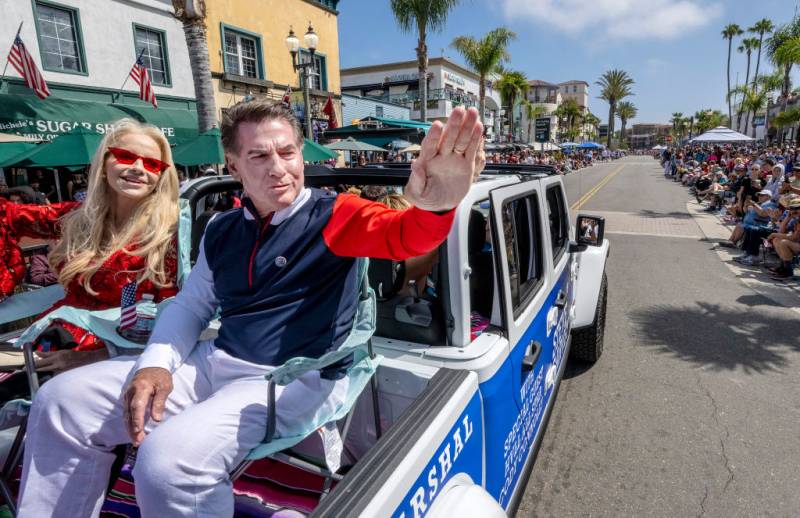“He would need to become the favorite among all Republicans in order to get himself higher in the polls,” DiCamillo said.
In the IGS poll, Porter stands at 17%, with Schiff at 16% and Garvey at 10%.
A former All-Star and World Series champion who played for the Los Angeles Dodgers and San Diego Padres, Garvey is the highest-profile Republican to launch a Senate run in California since former Hewlett-Packard CEO Carly Fiorina’s unsuccessful bid more than a decade ago.
But Garvey, who waited until October to officially launch his campaign, now faces a sprint to introduce himself to voters, raise money and fend off two other Republicans in the race: businessman James Bradley and attorney Eric Early.
Just getting a candidate on the November ballot will be an uphill battle for Republicans in the Senate race. California has a top-two primary system, which means voters can select any candidate, regardless of political party. Only 24% of voters in the state are registered as Republicans, and the party has struggled to make inroads with independent and moderate voters.
Thus far, Republicans have divided their votes among the top three GOP contenders in the Senate race, which could dilute the Republican vote and complicate the GOP path to the general election.
While Garvey still sits outside of the top two, some of the underlying numbers are encouraging for him. Not only has he leaped ahead of Bradley (7%) and Early (4%) among likely voters, but he is the top choice among voters who identified as “strongly conservative” or “somewhat conservative.”
Most importantly, Garvey — known as “Mr. Clean” during his playing days — appears to have room to grow. The IGS poll found that roughly a third of voters who identify as “strongly conservative” or “somewhat conservative” are undecided in the race — compared with just one in five “somewhat liberal” or “strongly liberal” voters who are undecided.
Kristin Olsen, a former Republican leader in the state Assembly, said the recent speakership fight in Congress shows the challenge of uniting fractious GOP constituencies around a common purpose. But she said Garvey, due to his career on the baseball diamond, has the advantage of being well-liked and better known than the other Republicans in the race.
“I’m not sure anyone can unite the party right now,” said Olsen, now a partner at the consulting firm California Strategies. “But I do think he may have a better shot than most because of the fame and charisma.”
Garvey, who has never run for public office, could face headwinds over some of the positions he has staked out early in the campaign, which seem antithetical to the party’s right-wing base. He told KQED in October that he opposes a national ban on abortion, a view in line with the majority of California voters, who last year approved a constitutional amendment protecting reproductive rights in the state. On gun safety, he supports waiting periods and “very stringent background checks” for gun purchases.

